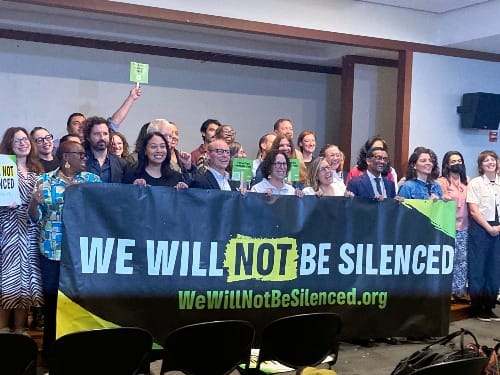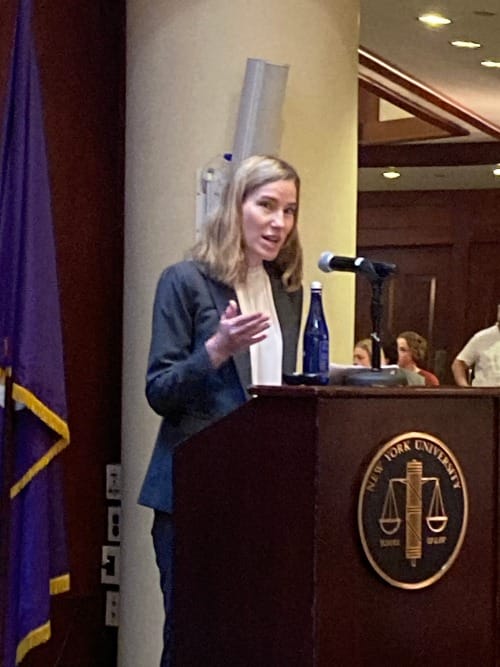From North Dakota To Vermont, States Are Emerging As Key Battlegrounds In Climate Court Fights

The United States is a hotspot for climate litigation – there are currently more than 30 lawsuits brought by states and municipalities seeking to hold major fossil fuel companies liable for their longstanding campaigns of climate denial and deception, and young people have brought constitutional climate claims against their government at the state and federal levels. But while litigation can be a powerful tool to leverage to pursue accountability for the massive damages wrought by the fossil fueled-climate crisis, it also can present immense headwinds and can be manipulated and wielded by powerful interests in attempts to evade accountability or to silence critics.
These challenges in the climate litigation landscape were discussed at several events during Climate Week in New York City. One focused on threat of strategic lawsuits against public participation (SLAPP), which are on the rise as extractive corporations turn to the legal system seeking to intimidate activists that speak out against their harmful business practices. “These lawsuits seek to stop us from speaking out about harms caused by the fossil fuel industry to our communities and to the climate,” explained Kristin Casper, general counsel at Greenpeace International, at a September 24 panel on the topic of “how collectively responding to the threat of SLAPP suits is necessary for climate action.”
Greenpeace is facing several SLAPP suits, including one in the US that poses an existential threat to the organization’s US operations. The oil and gas pipeline company Energy Transfer is currently suing Greenpeace USA and Greenpeace International over the indigenous-led resistance and protests at Standing Rock to the Dakota Access Pipeline. Energy Transfer “accuses the Greenpeace organizations of things we did not do, and attempts to penalize ordinary public advocacy, particularly free speech and public protest,” said Casper. Greenpeace did not organize the 2016-17 pipeline protests, and yet Energy Transfer’s lawsuit seeks $300 million plus other penalties, which could bankrupt Greenpeace USA. Energy Transfer brought the lawsuit in North Dakota, one of 18 states that does not have an anti-SLAPP law, following a failed attempt to pursue claims against Greenpeace in federal court. The case in North Dakota is scheduled to go to trial in February 2025.
More broadly, activists say that SLAPPs represent a threat to human rights and democracy, and that they demonstrate how litigation can be weaponized to serve the rich and powerful. “Increasingly we see wealthy special interests use litigation in a way that can only have the impact of silencing us, intimidating us, stifling dissent,” said Ben Jealous, executive director of the Sierra Club.
“SLAPPs are really dangerous because they play into the hands of those who have the power and the privilege to engage in litigation,” added Nani Jansen Reventlow, a human rights lawyer and founder of the nonprofit law firm Systemic Justice. “And it exposes a really hard truth – that litigation and our legal systems are not set up to serve justice.”
For one illustration of that “hard truth,” look no further than the Juliana et al. v. United States youth climate lawsuit, which has seen unprecedented obstruction from the federal government defendants in attempts to block it from getting to trial. A federal appeals court has now twice shut the courthouse doors on the 21 young plaintiffs, and although they are making a last-ditch plea to the US Supreme Court, this could very well be the end of the road for Juliana after nearly a decade.
With the federal judiciary trending more conservative, the most promising pathway for climate action and accountability in the US appears to be at the state level.
“We’ve shifted our strategy somewhat to start thinking about how we can bring these types of cases in state courts,” Mat dos Santos, co-executive director at Our Children’s Trust, said during a September 24 panel titled “Climate Change and the Courts” held at NYU Law School. “By bringing these cases in state courts, we can eventually force the federal court system to make the right decision.”
Our Children’s Trust has recently started to see some success with this strategy. “Last year we won a landmark victory in Montana at the district court level,” dos Santos said. That case, Held et al. v. State of Montana, actually went to trial in one of the first times in the US that climate science was presented as evidence in open court. The trial judge ultimately ruled in favor of the youth plaintiffs, finding that their right to a clean and healthful environment under the Montana constitution had been violated by the government’s pro-fossil fuel policy. Another youth climate case, brought against the Hawai’i Department of Transportation, resulted in a landmark settlement agreement in June. The agreement recognizes youth plaintiffs’ right to a stable climate under the Hawai’i constitution and sets up a pathway for decarbonizing the state’s transportation system.
“Despite what is happening at the federal level in the United States right now, there are mechanisms for us to redeem our constitutional rights and to make immediate impacts on climate by using the state courts,” dos Santos said.
Some states are even using their courts to go on offense and take the fight for climate accountability directly to the fossil fuel industry. These cases have been bogged down in procedural battles as the industry has tried relentlessly yet unsuccessfully to move them into federal courts. While that may have delayed proceedings, the litigation for the most part is now moving ahead in state courts.

Vermont is one state that has sued Big Oil for its alleged deception over climate change. The case, filed in 2021, is now pending on defendants’ motion to dismiss in state court. Vermont Attorney General Charity Clark, speaking at the Climate Change and the Courts panel, explained that it is a straightforward consumer protection lawsuit that “does not address environmental harm” or seek damages for the impacts of climate change. Instead, the case is grounded in the understanding that companies like ExxonMobil lied to the public about the consequences that unchecked fossil fuel usage would have on the climate. “These companies sought to mislead consumers about the risks and dangers of their products, including the connection between their products and climate change,” Clark said.
Vermont is also in the position of anticipating having to play defense against Big Oil in court, with the state being the first in the nation to pass a law that makes large fossil fuel extractors and refiners liable for helping to pay for some of the costs associated with responding to the climate crisis. Vermont’s Climate Superfund Act became law in May and is in the early stages of implementation. “This is novel, for how a challenge to this law would play out,” Clark said. While no lawsuit challenging the law has been filed yet, it is expected that fossil fuel companies implicated by the legislation would turn to the courts.
“If the law is challenged, we stand ready to defend it,” Clark said.
She also hinted at potentially forthcoming litigation that Vermont might bring to combat greenwashing or to target corporations that have deceived consumers about the environmental sustainability of their products or business. “I created a greenwashing team in my office to look into other companies that might be misleading consumers,” Clark said. “So stayed tuned.” This statement came just one day after California’s attorney general announced a new, first-of-its-kind lawsuit alleging ExxonMobil misled consumers about the effectiveness of plastics recycling.


